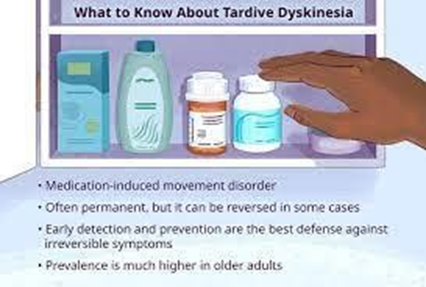Which medication side effect is irreversible if not caught early:
Akathisia
Tardive Dyskinesia
Dystonia
Akinesia
The Correct Answer is B
Choice A rationale: Akathisia refers to restlessness and agitation and is a common side effect of antipsychotic medications. This condition can be reversed by reducing the dose of antipsychotic medication taken by the client.
Choice B rationale: Tardive dyskinesia refers to the involuntary movement of body parts such as the limbs, face, jaw, and tongue and is a common side effect of long-term use of first-generation antipsychotic medications which work by blocking dopamine receptors. This condition is irreversible, especially when not detected early.
Choice C rationale: Dystonia which refers to muscle spasms affecting the jaw, eyes, and limbs can be reversed by the use of anticholinergic medications or botulin toxin.
Choice D: Akinesia refers to the absence of movement and can be managed by adjusting the dosage of the antipsychotic medications being taken by the patient.

Nursing Test Bank
Naxlex Comprehensive Predictor Exams
Related Questions
Correct Answer is A
Explanation
Choice A rationale: transitioning clients out of the facility as quickly as possible is not a goal of a therapeutic environment but instead the therapeutic environment focuses on providing maximum support and an appropriate level of care to clients until they are ready to transition to a less restrictive setup.
Choice B rationale: this is essential for client safety and the safety of individuals surrounding them while promoting effective crisis management.
Choice C rationale: this is appropriate since it enhances the client’s self-worth and confidence which is crucial in boosting their self-esteem and motivation.
Choice D rationale: this is correct since effective adaptive skills enable clients to cope with their challenges and improve their functioning.
Correct Answer is C
Explanation
Choice A rationale: this response is dismissive and invalidating since it suggests that anger is a normal and expected feeling hence the client should not feel bad about it.
Choice B rationale: this statement is presumptuous and doesn’t offer help to the patient. Furthermore, the care provider should understand that everyone’s experience and reaction after a divorce is different.
Choice C rationale: this statement empathizes with the client’s feelings and emotions without making them feel judged and guilty for expressing their emotions. It also allows the client to share more about their experience if she wishes.
Choice D rationale: this response is very unrealistic and disrespectful since it does not address the patient’s feelings and emotions about the divorce but instead it tries to impose a positive outlook on her.
Whether you are a student looking to ace your exams or a practicing nurse seeking to enhance your expertise , our nursing education contents will empower you with the confidence and competence to make a difference in the lives of patients and become a respected leader in the healthcare field.
Visit Naxlex, invest in your future and unlock endless possibilities with our unparalleled nursing education contents today
Report Wrong Answer on the Current Question
Do you disagree with the answer? If yes, what is your expected answer? Explain.
Kindly be descriptive with the issue you are facing.
